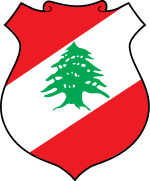Ministry of Culture (Lebanon)
 | |
| Agency overview | |
|---|---|
| Formed | 1993 |
| Jurisdiction | Government of Lebanon |
| Headquarters | Beirut 33°53′32″N 35°29′5″E / 33.89222°N 35.48472°E |
| Agency executive |
|
| Website | www |
 |
|---|
|
|
The Ministry of Culture (French: Ministère de la Culture, Arabic: وزارة الثقافة) is a government ministry of Lebanon.
History
The Ministry was formed in 1993,[1] originally as part of the Ministry of Culture and Higher Education from which it became a separate entity in August 2000. A new law was passed in October 2008 regarding a re-structuring for the Ministry. It now has responsibility over matters of heritage, antiquities, arts, literature, cultural industries and management of cultural and historical property.[2]
Tasks and responsibilities
The ministry's remit includes various tasks such as planning cultural and sectoral policy, organising and sponsoring literary and artistic affairs, developing the knowledge economy and establishing and co-ordinating expertise. Responsibilities include proposing draft laws and regulations, promoting creativity, research and productivity, promoting innovative products, establishing cultural facilities, archaeological surveys and excavations, preservation and public display of antiques and managing ancient sites. The ministry also supports and facilitates research in cultural fields organizes cultural events and conferences.
Structure
The Ministry is divided into three units, The Directorate General of Cultural Affairs, The Directorate General of Antiquities and The Joint Administrative Service. It also runs The Baakleen National Library, the General Authority for Museums and the National Higher Institute of Music. It is also attached to the National Committee for Education, Knowledge and Culture.
Former ministers
- Michel Edde (1993–1996)
- Fawzi Hobeiche (1996–1998)
- Muhammad Baydoun (1998–2000)
- Ghassan Salameh (2000–2003)
- Ghazi Aridi (2003–2004)
- Naji Al-Boustani (2004–2005)
- Karam Karam (2005)
- Assaad Rizk (2005)
- Tarek Mitri (2005–2008)
- Tammam Salam (2008–2009)
- Salim Wardeh (2009–2011)
- Gaby Layyoun (2011–2014)
- Rony Araygi (2014–2016)
- Ghattas Khoury (2016–2019)
- Mohammad Daoud (2019–2020)[3]
- Abbas Mortada (2020–present)
See also
References
- ^ David Lawrence Livingston; Columbia University (2008). Sects & cinema in Lebanon. Columbia University. p. 249. ISBN 978-0-549-51467-1. Retrieved 4 May 2011.
- ^ World Intellectual Property Organization (2003). Performance of copyright industries in selected Arab countries: Egypt, Jordan, Lebanon, Morocco, Tunisia. World Intellectual Property Organization. p. 135. ISBN 978-92-805-1316-5. Retrieved 4 May 2011.
- ^ https://www.znn-lb.com/archives/289841
